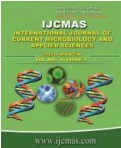


 National Academy of Agricultural Sciences (NAAS)
National Academy of Agricultural Sciences (NAAS)

|
PRINT ISSN : 2319-7692
Online ISSN : 2319-7706 Issues : 12 per year Publisher : Excellent Publishers Email : editorijcmas@gmail.com / submit@ijcmas.com Editor-in-chief: Dr.M.Prakash Index Copernicus ICV 2018: 95.39 NAAS RATING 2020: 5.38 |
Experiment was carried out to study the effect of biofertilizers viz., Azotobacter, phosphate solubilizing bacteria and potash mobilizing bacteria, alone and in combinations along with different doses of inorganic fertilizers on yield of wheat. Highest number of tillers per hill (10.8), plant height (98.71 cm) and thousand grain weight (43.09 g) was recorded in seed treatment with MPKV Consortium + 100% RDF. Highest grain yield (44.22 q/ha) was also recorded in same treatment of MPKV Consortium + 100% RDF which was at par with treatment with 100% RDF (42.20 q/ha) while, the lowest wheat grain yield was recorded in absolute control treatment (28.16 q/ha). Seed treatment with MPKV consortium increased 2.64 q/ha yield over control plot. Seed treatment with MPKV consortium along with recommended dose of fertilizer was found to be the best treatment in enhancing yield of wheat crop and increased 2.02 q/ha yield over the treatment in which only recommended dose of fertilizers was used. Soil nutrient status after crop harvest was found superior in the same treatment. Microbial activity in rhizosphere remained at elevated level in the treatment where biofertilizers inoculants were used but inorganic fertilizers were not added. The increment of yield and its components due to the biofertilizer inoculation may be attributed to the increase in nitrogen fixation, phosphate solubilization, potash mobilization and the production of plant growth promoting substances that enhance soil microbial activity that contributes towards the nutrient availability to plants. The application of biofertilizer increased the efficiency of both organic and inorganic fertilizers but alone was ineffective in increasing yield.
 |
 |
 |
 |
 |